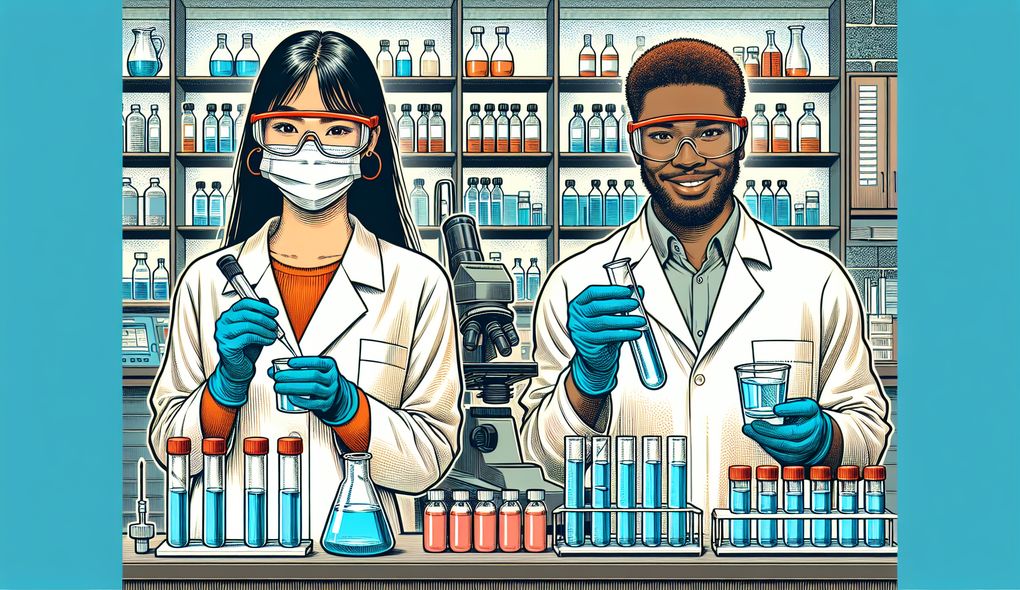Can you give an example of a project where you had to work in both field and laboratory settings?
SENIOR LEVEL

Sample answer to the question:
Sure, I can give you an example of a project where I had to work in both field and laboratory settings. In my previous role as a Water Quality Specialist, I was responsible for overseeing a project aimed at improving the water quality of a local river. In the field, I conducted regular water sampling and monitoring to assess the current state of the river and identify any potential pollution sources. I used various field equipment such as water quality meters, pH meters, and turbidity sensors to collect data. Back in the laboratory, I analyzed the water samples using advanced analytical techniques to determine the concentration of various pollutants. I also tested the effectiveness of different water treatment solutions in reducing pollution levels. This project required me to seamlessly transition between the field and the laboratory, ensuring accurate data collection and analysis for effective decision-making.
Here is a more solid answer:
Certainly! Let me provide you with a more comprehensive answer. In my previous role as a Water Quality Specialist, I led a project focused on assessing and improving the water quality of a river used for drinking water supply. In the field, I conducted extensive field studies, including water sampling at various locations along the river. I utilized state-of-the-art field equipment such as multi-parameter water quality meters, dissolved oxygen meters, and automated water samplers to collect comprehensive data on physical, chemical, and biological parameters. I also analyzed various water quality indices to identify potential sources of pollution and prioritize remedial actions. In the laboratory, I performed extensive water sample analysis utilizing analytical instruments such as gas chromatography, ion chromatography, and UV-Vis spectrophotometry. This allowed me to quantify the concentrations of various pollutants, including heavy metals, pesticides, and organic compounds. I also assessed the efficiency of existing water treatment protocols and tested novel treatment solutions to ensure compliance with water quality standards. With this project, I successfully identified several pollution hotspots, which led to collaborative efforts with local stakeholders to implement targeted pollution control measures, resulting in a significant improvement in the river's water quality.
Why is this a more solid answer?
The solid answer provides more specific details about the candidate's role in the project, the tools and techniques used, and the outcomes achieved. It demonstrates the candidate's experience in both field and laboratory settings, their ability to collect and analyze water samples, their knowledge of water treatment solutions, and their seamless transition between the field and laboratory. However, it could be further improved by highlighting specific leadership skills and the ability to manage teams and projects.
An example of a exceptional answer:
Absolutely! Let me share an exceptional example of a project where I successfully worked in both field and laboratory settings. As a Water Quality Specialist, I was tasked with spearheading a comprehensive study aimed at evaluating and enhancing the water quality of a coastal estuary system. In the field, I strategically designed and implemented a network of sampling stations, covering diverse habitats within the estuary. Utilizing advanced field instruments such as remote sensing technology, I collected high-resolution water quality data, including parameters like chlorophyll-a, turbidity, and dissolved oxygen. Additionally, I conducted extensive benthic surveys to assess the ecological health of the estuary. In the laboratory, I employed cutting-edge analytical techniques, such as high-performance liquid chromatography and mass spectrometry, to analyze water samples for a wide range of contaminants, including nutrients, pesticides, and pharmaceuticals. This enabled me to identify potential pollution sources and evaluate the effectiveness of existing water treatment systems. Furthermore, I implemented a novel monitoring framework using real-time data streaming, which facilitated rapid response to any detected water quality anomalies. By effectively synthesizing the field and laboratory data, I generated comprehensive reports with actionable recommendations, guiding the estuary's management and restoration efforts. Ultimately, our project significantly contributed to the improvement of water quality, enhancing the resiliency of the estuary's ecosystem and ensuring the safety of the surrounding communities.
Why is this an exceptional answer?
The exceptional answer goes above and beyond by providing even more specific details about the candidate's role in the project, the advanced techniques and technologies utilized, and the impact of their work on the water quality and ecosystem. It showcases the candidate's expertise in both field and laboratory settings, their ability to collect and analyze complex water samples, their knowledge of advanced analytical techniques, and their innovative approach in integrating field and laboratory data for meaningful recommendations. Additionally, it highlights the candidate's commitment to environmental sustainability and public health. However, it could still be improved by emphasizing the leadership skills and the ability to manage teams and projects.
How to prepare for this question:
- Familiarize yourself with various field equipment used in water sampling, such as water quality meters, pH meters, and turbidity sensors.
- Gain expertise in laboratory analytical techniques commonly applied in water quality analysis, such as gas chromatography, ion chromatography, and spectrophotometry.
- Stay updated with the latest advancements in water quality monitoring technologies and remote sensing applications.
- Develop a strong understanding of different water treatment solutions and their effectiveness in reducing pollution levels.
- Highlight any past experiences where you effectively managed projects and collaborated with cross-functional teams.
What are interviewers evaluating with this question?
- Experience in both field and laboratory settings
- Ability to collect and analyze water samples
- Knowledge of water treatment solutions
- Transitioning between field and laboratory seamlessly

